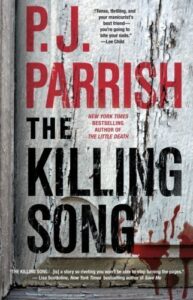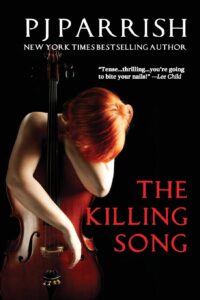(Morning, crime dogs. I am out of the country and purposely out of computer contact for four weeks on a two-year-delayed vacation. When you read this, I hope to be sitting in a Paris cafe, sipping vin de maison and stuffing my face with a croque monsieur. So forgive me, but I’m posting a couple of old columns. I will try to check in via iPhone. À bientôt!)
Nothing will stop you from being creative so effectively as the fear of making a mistake. — John Cleese.
By PJ Parrish
I’ll never forget this piece of advice I got from my agent: “No one is waiting for your stand alone thriller.”

Immediately, my hackles went up. (As I wrote that, I realized I didn’t really know what a hackle even was so I Googled it. It is the hairs on the back of dog that shoot up when he’s angry). I said nothing to the agent, but hackles erect, I hung up the phone, and opened the laptop to finish my stand alone thriller.
See, we were eleven books deep into our Louis Kincaid series at the time, and the series had done pretty good thus far. We had a loyal fan base who really loved our character. We’d won some awards and cracked some bestseller lists. But here’s the thing: I had this idea for a serial killer book set in Paris and I couldn’t let go of it. The bad guy — a professional cellist — haunted my dreams at night and kept my imagination afire during the day. I couldn’t get anything done on the series book. The stand alone was a siren call.
Would it crash us on the rocks? Well, maybe. At the time, we were coming up on a contract renewal with our publisher and they were expecting a new Louis book. But Louis was, well, being sort of recalcitrant. The story wasn’t moving along because he just wasn’t talking to me. We clearly needed a vacation from each other.
So I took up with the killer cellist. The book poured out of me, uncharacteristically. (I am a really slow writer). And it was really good. I’m not being immodest here. Every writer just knows when they’re onto something. it was solid plot-wise, filled with cool pretzelly stuff. It had a haunted protag, a prickly side-kick woman cop, and a charming villain who just had a hangup about garroting women with e-strings. It also had Paris’s catacombs, Miami’s decaying art deco hotels and crumbling Scottish castles.
What wasn’t to love?


The publisher grudgingly put it out. No promotion, small press run and an ugly cover. (see above left for original cover and right for new cover when we re-issued it). It got some nice reviews and didn’t sell well (though it sells fine now as a back list title). It remains one of my favorite books. We were dropped by the publisher not long after that.
Did I make a mistake?
My agent was probably just trying to tell me that we didn’t have the star-power name to write whatever we wanted, that we needed to rely on the safety our our serial reputation. Stay with what brung you to the dance, right? But no, I don’t think it was a mistake. Here’s my take-away for any of you out there who might be struggling with the fear that you might make a mistake:
Anyone who has never made a mistake has never tried anything new.
Okay, that’s not my words. Albert Einstein said them. But I believe them. If you write in fear of doing something wrong, you are doomed. Whether you are venturing into a new genre, experimenting with a different plot structure, or trying to write a short story for the first time, or just switching from the comfort of first person to third, you can’t be afraid to fail.
I had to write that book. I just had to.
But how do you know when you’re onto something good? How do you trust your instinct to stay with a story when your brain might be telling you to jump on the neo-fem-jeop bandwagon? (female in jeopardy but with a new twist, of course).
That’s a hard one. No one can answer that one except you. It’s part of that chimeric thing we call voice. Why would you want to be a poor man’s Jeff Deaver? Or another sad clone of Gillian Flynn? Write the book that only you can write.
Here’s something else to chew on: Sometimes doing something the wrong way is the only way to find the right way. Writing fiction is not a straight-forward process. Yes, there are basic tenets of what makes a story work — plot structure, dialogue, all the craft stuff we talk about all the time here. But even if you follow every “rule” to the letter, there’s no guarantee you’re going to succeed. If you concentrate on what is safe, what is trendy, what is sell-able (revelation: No one really knows what will sell) you will produce junk.
Maybe, after all your work, no editor will want to publish your book. Maybe, after you work hard to get it up on Amazon yourself, not enough readers will find it. Was it a mistake?
- Not if it helped you grow as a writer. Maybe you rushed your book into print before it was ready (ie not well edited or formatted). Sloppy doesn’t cut it.
- Not if it made you stronger. No one is ever going to be harder on you and than you are. Rejection comes with the business at every turn. Mistakes help you grow a shell.
- Not if it helps you find your way to your next story. And there always had to be a next book.
So, what’s my final takeaway from all this? What did I learn from my mistake of writing the stand alone thriller that no one was waiting for?
Don’t write the book you think might sell. You have to write the book that is tearing at your insides to get out.
Write the book that keeps you up at night.

Thanks for the reminder to take risks, much needed advice, right now.
Enjoy your vacation in the beautiful, addictive city of Paris.
I’m a professional cellist, so now I have to read The Killing Song. Maybe it will add spice to my next performance.
Enjoy your vacation in Paris! Eat a Nutella crepe for me.
It’s almost 6 A.M. in L.A., and I’ve been up since 2:00, working on a Shakespearean sonnet. It’s for Act III of my WIP play about “Bill,” who, after a wild costume party, suffers from the delusion that he’s William Shakespeare. He writes a sonnet for his roomie in an attempt to convince her he really is Shakespeare.
I’ve never sold a play. This will be #25. Will Shake❟ Willy sell? Probably not. But I finally noticed this very synchronous advice about 5 minutes ago:
“Write the book that keeps you up at night.”
And here I am, before dawn, writing a love poem.
“Don’t write the book you think might sell. You have to write the book that is tearing at your insides to get out. //Write the book that keeps you up at night.” That’s going into my writing quotes file. Great post. Thanks.
Your words of wisdom have struck the hair on my own neck. Thank you,
With a fifty year perspective of my career, I’ve figured out that sometimes we write for ourselves more than for our readers. Sadly, what keeps us sane and fulfilled as writers can be a stupid career move where writing the same and safe is what our agents and publishers want.
Have a lovely time in Paris.
Great advice, Kris. Your cellist is playing my song. 🙂
Have a wonderful time in Paris.
I’m not seeing the “mistake.” To me it’s like taking a vacation to a great place your spouse doesn’t want to go to for highly subjective reasons they can’t or won’t unpack beyond a few grumbles like “Nobody wants to go there” and is therefore determined to have a bad time regardless of how awesome it is — and winds up sabotaging the entire experience as a result. They went because they care about you, but I suspect we’ve all had people in our life who a) care a great deal about us; and b) undermine us from time to time in the service of “being honest with you.” Is that a reflection on you and the quality of your choice? I don’t think so. So don’t be gaslit into thinking you made a “mistake.” Your publisher decided to set you up to fail (based on what you’ve shared). And since you didn’t get divorced, I hope at least there was some counseling, or at least some long hard talks about the publisher’s willful faithlessness in a committed relationship. If your takeaway today remains that you made a “mistake,” I would question the foundation of that relationship going forward.
In the year 2000, while I was working on a detective series I hope to get back to some day (and whose first book hasn’t sold yet, though I was working on the second at the time), the idea for my mainstream trilogy, Pride’s Children, landed in my lap like the pool at the bottom of the waterfall from the confluence of many idea rivers, and would not be denied. Twenty-two years later, I have just published the second novel in that trilogy, and can’t wait to get back to the third.
I like to say the story was vouchsafed to me, in one piece.
Was it a mistake to suddenly switch to something very different from what I was hoping would turn into a nice detective series? I don’t know. I LIKED that series. I will go back to it if I get the chance, but the trilogy is my focus until I finish it. Because it must be.
Paris.
I’m jealous. Wait, what? I hate to travel. But if a wicked genie popped out of the Starbucks cup and told me I had to choose, travel or never write another sentence again, I’d choose Paris.
As for the rest? Best advice I’ve heard twice, my friend! (And it’d probably be good for round three also…)
Hope you come back safe and sound and brimming with ideas.
🙂
Yes. This. As Nina Kiriki Hoffman said, “Dare to be bad.”